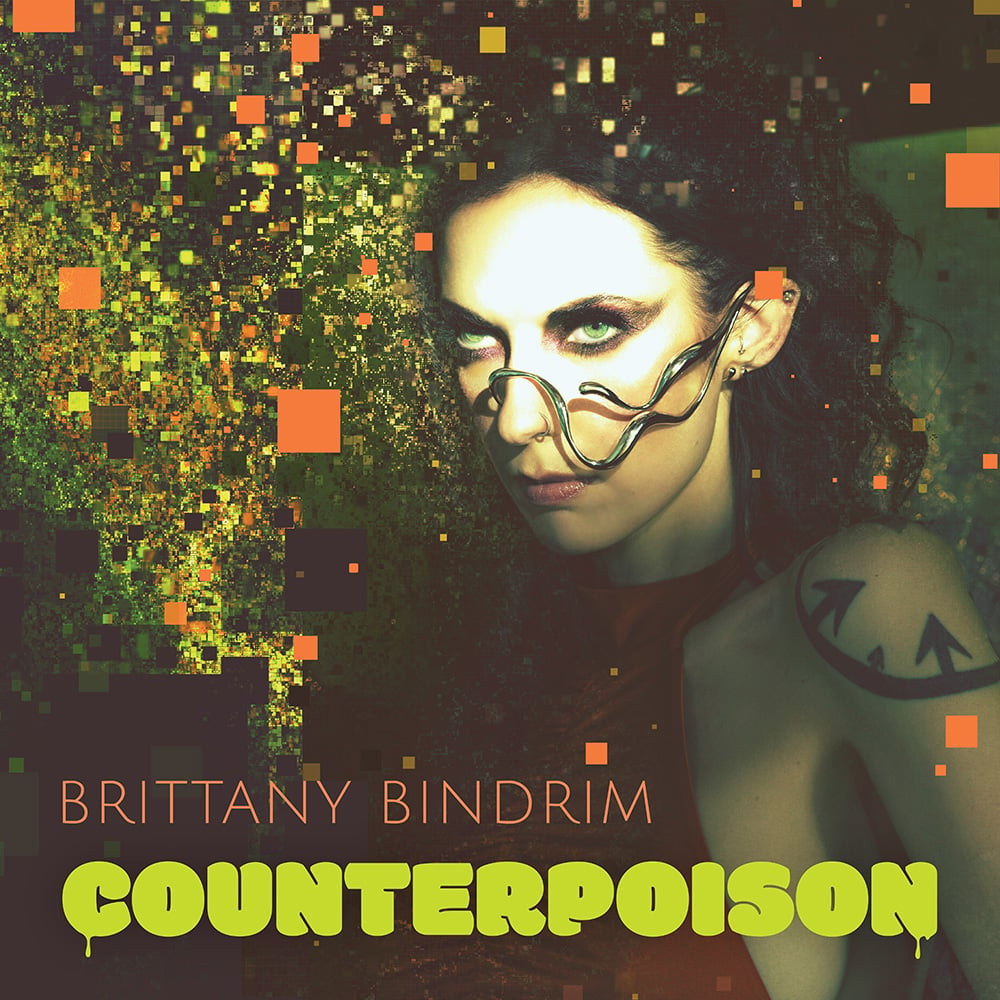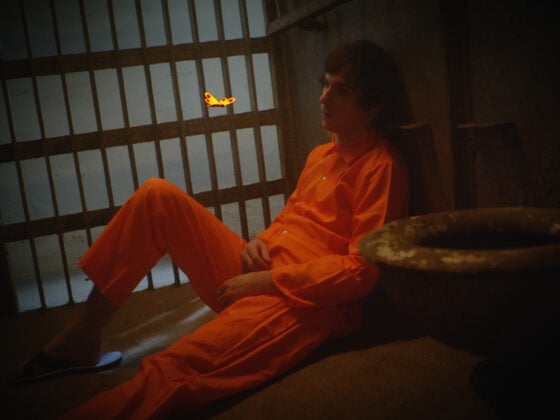Sword within the sheath
Like our hopeless fantasies
Truth spinning underneath
All these sleeping galaxies
Counterpoison is not a record that asks for your trust, it earns it through fire and fracture. Chicago artist Brittany Bindrim drags darkwave through the wreckage of modernity, tempering its metallic sheen with something rawer, angrier, and defiantly human. Where her last offering, Velella Velella, floated like a fever dream, Counterpoison clenches its teeth: every synth line a blade, every beat a blow struck against paralysis. It is a work born from confrontation: with power, with self, with the seductive toxins of apathy and control.
The title becomes a credo. Counterpoison is music as medicine, the creative act as act of resistance. Bindrim writes of corrosion and cure in the same breath, tracing the thin line between healing and harm. Her voice, alternately crystalline and caustic, cuts through the industrial fog like a signal flare, a reminder that even despair can be repurposed into strength. These are anthems for the anxious age, but also incantations for endurance.
A dirge of apocalyptic resignation, opening track Ever So Slowly seethes with liturgical irony. “Holy, holy,” the choir cries…in futility. Its verses indict spiritual hypocrisy and the machinery of blind faith, where knowledge is drowned and empathy erodes. The song moves like a slow, collapsing empire, condemning the sanctity of indifference. Musically, it’s a darkwave/synthpop behemoth: slinky in its verses, crushing in its chorus. Synths coil and strike, industrial beats hammer with mechanical precision, and each hook opens like a trapdoor beneath your feet. It’s a rallying cry disguised as a dance track, pulsing with urgency while the lyrics chart the slow-motion disintegration of a world too distracted to notice its own undoing.
The accompanying self-directed video, created with Simona Noreik, channels that tension into visceral imagery: a rapid-fire montage of graphic intensity and dystopian allure. Fantastical landscapes fracture under confrontation; dancers twist as though shedding invisible chains; bursts of fire slice through frozen horizons. It unfolds like a fevered reel from a lost sci-fi epic, where every frame feels prophetic and personal.
Spiral Out is a sermon from the altar of control; an exorcism of ego, coercion, and dependency. Rapid percussion lies a bed where the vocals deliver that lyrics slither between dominance and surrender, sketching a relationship that doubles as a metaphor for consumer addiction and personal corruption. Its pulse is feverish; its mood, narcotic. A spiral, yes, but a deliberate one; the dance of predator and willing prey.
A melancholy meditation rendered in digital twilight, Hunting in the Dark blends rain-soaked introspection with a synthetic pulse that hums like distant circuitry. The lyrics trace a ritual of self-recognition; to name the demon is to tame it. Beneath the song’s Depeche Mode veneer lies something more ancient: the lure of illusion, the intoxication of chasing ghosts. It’s a nocturne for those who have mistaken desire for destiny and learned, finally, to see in the dark.
Ouroboros is a slow-burning, rhythmic dark electronic trip-hop pulse that coils into infinity. Every refrain folds back upon the last, each lyric echoing a cosmic recursion: “End at the start…Begin at the end.” Its tone is serene but haunted, as if enlightenment comes only through surrender to repetition. The serpent devours its tail in an unbroken circle of flesh, faith, and failure.
The frozen horizon of Long Time Coming stretches toward oblivion, like the dirge-laced dreams of Memento Mori-era Depeche Mode. Cinematic beats and shadowy vocals conjure Images of icicles and insulated hearts, conjure emotional hibernation, the stillness after catastrophe. Yet, within the frost, something divine stirs. Beneath layers of numbness, the song suggests resurrection. It’s a ballad for those thawing from spiritual hypothermia, inching toward a future they no longer trust but still chase.
With a knocking trip-hop beat that conjures an atmosphere both earthbound and nightsky, Sleeping Galaxies is an astral love song to impermanence, a flash of heat against cosmic indifference. It ascends and descends in measured breath. Its imagery: laughing until crying, racing toward the night, carries the tragic joy of beings aware of their own briefness. Beneath its radiant poise lies an ache for unity; lovers as collapsing stars, bound to reassemble in another form. It’s the sound of eternity holding its breath.
A caustic chant of propaganda and exhaustion, Warplane laces its militaristic rhythm with industrial pop nihilism. The repeated “nah nah nah”s sound like the sneer of regimes and rock stars alike, empty slogans disguised as salvation. The song’s fog of drones, demagogues, and broken faith paints a world numbed by repetition. It’s protest music for the disenchanted – not a call to arms, but a recording of the static left after too many have answered.
With knelling synths and cinematic swells, Stray is a hymn to the dangerous sanctity of love. Its verses entwine mysticism and temptation, invoking Maldoror and the blurred border between worship and ruin. In its final ascent, Stray becomes an ecstatic confession: love as ritual fire, burning both supplicant and saint. On Marionette, a powerful vocal delivery shines a light on the sacred and profane, which dance in mirrored devotion, while a buzzing mechanical melody mesmerizes, pulling the beat along. The song’s tone is ritualistic and incantatory; faith and sin collapse into a single continuous gesture. The strings of control snap, but liberation feels just as choreographed. In this theatre of absolution, even freedom performs for an unseen god.
Finally, Cradle, with vocals laced with a divine tenderness and wrapped in rippling, bubbling, metallic synth beats, traces the dissolution of the body and the persistence of the spirit. “Lay me down where I fell,” the voice pleads. Death is a shedding of form, a return to dust, rain, and root. The song radiates serenity in surrender; the hush of a star burning out gracefully, knowing that light will find another vessel.
Counterpoison is out now. Listen to the album below and order it here.
Produced by Matt McJunkins at Secret Hand Studios and mastered by Ken “Hiwatt” Marshall, the album wields its polish as provocation. Its synths hum like power grids, its rhythms grind like factory gears, yet inside the machinery there’s a pulse, furious, fragile, and unflinchingly alive. Counterpoison metabolises the contagion of its time, turning poison into proof of life.
Tour Dates:
- Nov 13 – Funhouse, Seattle, WA
- Nov 14 – Coffin Club, Portland, OR
- Nov 22 – Bar Sinister, Los Angeles, CA
Follow Brittany Bindrim:
















 Or via:
Or via: